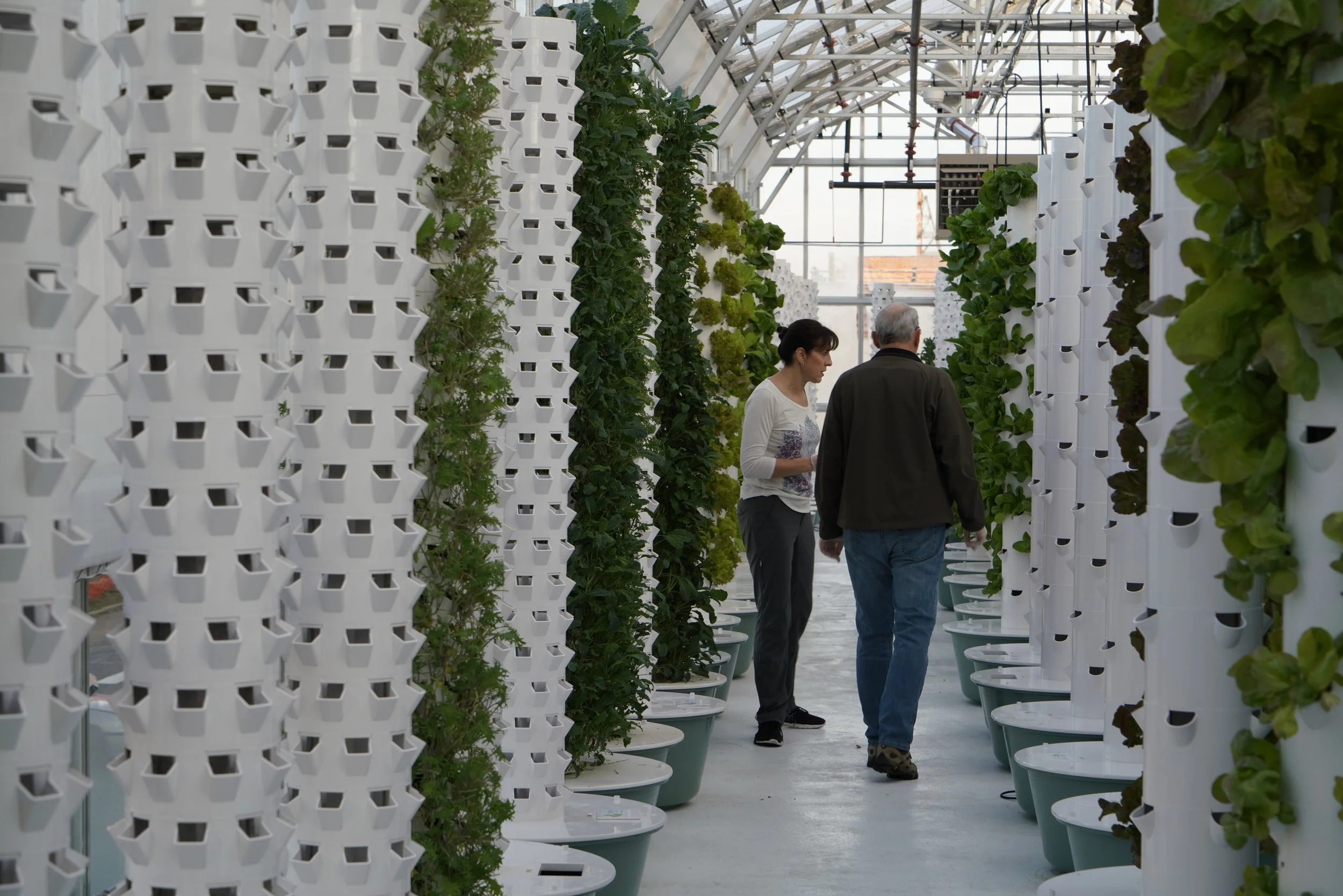What Nutrients Do I Need For A Tower Garden

Tower Farms and Tower Gardens
What is the difference between a Tower Garden and a Tower Farm?
A Tower Garden is a modular hydroponic food-growing system that can be used on any leveled surface with access to water and electricity. It is a sustainable growing method that saves 90% on land and water resources. Tower Gardens grow food without soil, eliminating the weeding and work of traditional gardening. The water is recycled and fully automated. No daily or weekly watering is needed. They are designed to flourish in urban environments. You can grow more than 150 different types of plants — anything from leafy greens and herbs like lettuce, collard greens, kale, endive, broccoli, cilantro, and basil to vining crops like tomatoes, eggplants, melons, squash, strawberries, beans, and more.
Each Tower Garden is 3 feet in diameter, typically 67' tall (height is adjustable), has 7 tiers, and grows 28 plants. A Tower Farm is a set of 13 or more Tower Gardens placed together. Watering and nutrient dosing is automated, and additional equipment is included like seedling benches and irrigation piping. A Tower Farm grows food at scale, they are modular, so you can add or subtract as many Towers as you need.
What is the difference between Hydroponics and Aeroponics?
Hydroponics is a method of growing plants with a nutrient rich water, without the use of soil. There are 101 ways to do this. Aeroponics is one way, and a form of hydroponics that grows plants with the roots suspended in the air, hence the "aero".
What makes this system distinct from other aeroponics systems is that we do not use spray misters to wet plant roots, which are notoriously know to break and clog often. Instead plant roots are suspended in the air, and water is showered over the roots, using a simple but robust distribution system, providing optimized air and water.
What are the growing system's dimensions and specifications?
An 11-section tower — which can grow up to 44 plants simultaneously — is 97 in. tall and weighs about 220 lb. when full. The 20-gal. reservoir at the tower's base measures 30 x 30 in.
Note: Tower Farms units are modular. So you can grow more or fewer plants per tower, if you prefer.
How much energy does a Tower Farm unit use?
The short answer is about 278 watts per tower, per day. We arrive at that answer with some simple math.
Tower Farms pumps are rated at 58 watts per hour. And running the pump on the recommended cycle of 3 minutes on / 12 minutes off adds up to 4.8 hours per day. So, 58 watts x 4.8 hours = 278.4 watts per day.
Just multiply that figure by your local energy rates to determine approximate electricity costs per tower.
How much water does a Tower Farms unit use?
If you're growing in average conditions, each tower will use about one gallon of water per day. So, to calculate daily water usage costs, simply multiply your number of towers by your local water utility rates.
What are Tower Farms products made of?
To ensure the food you grow is safe and healthy, we use only UV-stabilized, food-grade plastic in our products.
Our high-quality plastic resins are compliant with both U.S. Food and Drug Administration guidelines for food contact and European guidelines for Restriction
of Certain Hazardous Substances.
What's in the Tower Farms nutrient solution?
Experts in human and plant nutrition developed the Tower Farms nutrient solution to ensure it safely nourishes both plants and the people who ultimately eat them.
The best part? It's the only plant food you'll need — for all plants in any stage of growth. Pretty simple!
Here's a look at what it contains:
-
Total Nitrogen (N) – 2.0%
-
Calcium (Ca) – 1.0%
-
Chelated Iron (Fe), derived from Calcium Nitrate, Iron Sodium EDTA – 0.05%
-
Available Phosphate (P2O5) – 1.0%
-
Soluble Potash (K2O) – 3.0%
-
Magnesium (Mg) – 0.5%
-
Sulfur (S) – 3.0%
-
Boron (B) – 0.01%
-
Copper (Cu) – 0.001%
-
Manganese (Mn) – 0.01%
-
Molybdenum (Mo) – 0.0005%
-
Zinc (Zn), derived from Potassium Nitrate, Potassium Sulfate, Magnesium Sulfate, Boric Acid, Copper Sulfate, Manganese Sulfate, Sodium Molybdate, Zinc Sulfate, Phosphoric Acid – 0.005%

Visiting the GFS Farms
Do you offer tours?
Yes! We give tours for larger groups. Visit our Events page to find out when the next public tour is. We offer private tours as well, please contact us to schedule an appointment.
Do you hold private events at the farm?
Yes we hold private workshops and corporate events. This includes team building outings and Farm to Table culinary experiences. Please contact us to schedule a call so that we can help you plan your next outing or event.

Seedling Orders
Are your seedlings Organic?
Our seedlings are grown naturally to organic standards from non-GMO seeds with no synthetic pesticides, herbicides or fungicides.
Can I put the seedlings directly into a Tower Garden? How about the soil?
Yes. Our seedlings are grown in the same rockwool that comes with your Tower Garden and are ready to plant when received. You can also transplant our seedlings into other hydroponic systems and the soil!
I just got my seedlings in the mail, and they look very wilted. Will they recover?
Our plant friends need water and light to thrive. Your seedlings are shocked from the travel. Allow 48 hours for seedlings to recover fully in your Tower Garden.
What Nutrients Do I Need For A Tower Garden
Source: https://www.greenfoodsolutions.com/faqs-1
Posted by: thomasthadvating.blogspot.com

0 Response to "What Nutrients Do I Need For A Tower Garden"
Post a Comment